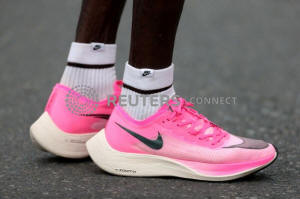Nike prototype Vaporfly shoe banned
but current version going to Olympics
 Send a link to a friend
Send a link to a friend
 [February 01, 2020]
By Mitch Phillips [February 01, 2020]
By Mitch Phillips
LONDON (Reuters) - Nike Vaporfly shoes
used to run the world's first sub-two hour marathon will be banned
from professional sport under a landmark decision on Friday that
also allows currently sold versions of the high-tech shoes to be
used in the Olympics.
The first-ever shoe ban by World Athletics (WA), the sport's
governing body, addresses concerns that technology advances are
giving athletes an unfair and unnatural advantage. It limits future
use of carbon fibre plates and some track spikes but stopped short
of outlawing the Vaporfly models that have helped re-write the
record books for elites and amateurs alike.

Prototype variants of the Vaporfly used by Eliud Kipchoge to run the
first sub-two hour marathon and by fellow Kenyan Brigid Kosgei to
smash the women's marathon world record were both reported to
contain triple carbon plates inside thick, ultra-compressed foam,
said by Nike to help improve running economy by up to four percent.
Those have been banned and from April 30 any future version, of any
shoe, must have been available to the general public for four months
before being allowed in elite competition. That will put paid to the
use by Nike and others of prototypes by their athletes in major
races.
Nike Inc <NKE.N> unleashed the Vaporfly in 2016 and various versions
have quickly come to dominate the elite and "serious recreational"
side of road running. The distinctive pink and green footwear, which
cost around $250 and have a lifespan of only around 200 miles, is
now widespread throughout the fields of every major race.
Kipchoge and other leading athletes have welcomed the shoes as a
natural technological advance, but others say they have gone too
far, with Yannis Pitsiladis, a professor of sport and exercise
science at Britain's Brighton University, calling them
"technological doping".
"It is not our job to regulate the entire sports shoe market but it
is our duty to preserve the integrity of elite competition by
ensuring that the shoes worn by elite athletes in competition do not
offer any unfair assistance or advantage," WA President Sebastian
Coe said in a statement on Friday.

World Athletics said any records set under the previous rules will
stand.
"We can draw a line by prohibiting the use of shoes that go further
than what is currently on the market," Coe said. "I believe these
new rules strike the right balance by offering certainty to athletes
and manufacturers as they prepare for Tokyo 2020, while addressing
the concerns that have been raised about shoe technology."
The new rules state that road shoes must have soles no thicker than
40mm and not contain more than one rigid, embedded plate.
The controversy could provide a boost for athletic equipment maker
Nike, burnishing the Vaporfly's reputation among amateurs not
affected by the ruling.
[to top of second column] |

2020 General view of an athlete wearing the Nike Vaporfly shoes
REUTERS/Christopher Pike

"If anything this probably brings more excitement around the
product," Edward Jones analyst Brian Yarbrough said. "Over
two-thirds of footwear that is bought, is bought for fashion
purposes."
WA will establish an expert working group to guide future research
into shoe technology and to assess new shoes that emerge on the
market.
Nike did not immediately respond to Reuters' request for comment on
the decision.
'SECRET WEAPON'
Marathon superstar Kipchoge has been the Vaporfly's flagbearer,
wearing them to set a world record, win the 2016 Olympic title and
then, in an advanced version not available to the public, go under
two hours in an unofficial marathon.
Kosgei ran 2:14.04 in last year's Chicago Marathon, taking 81
seconds off Briton Paula Radcliffe's 16-year-old women's marathon
world record and making her almost three minutes faster than any
other woman in history.
Vaporflys have featured in several other records in the last three
years and athletes wearing them took 31 of the 36 top-three finishes
in the Marathon Majors series last year.

Nike says the shoes have "a built-in secret weapon that provides a
propulsive sensation".
Other manufacturers have also released, or are developing, their own
carbon-insoled shoes, but WA's ruling would now appear to have put
the brakes on.
WA's action echoes that of swimming' s governing body, which a
decade ago banned Speedo's record-smashing LZR speed suit.
Kosgei, however, was unmoved when asked by Reuters about the ban.
"The shoes did not have legs to run, it is the power and energy of
an athlete," she said. "Not every athlete who wore the shoes ran a
world record."
(Reporting by Mitch Phillips; Additional reporting by Nivedita Balu
in Bengaluru and Omar Mohammed in Nairobi; Editing by Peter
Henderson, Hugh Lawson, Toby Davis and Daniel Wallis)
[© 2020 Thomson Reuters. All rights
reserved.] Copyright 2020 Reuters. All rights reserved. This material may not be published,
broadcast, rewritten or redistributed.
Thompson Reuters is solely responsible for this content.
 |